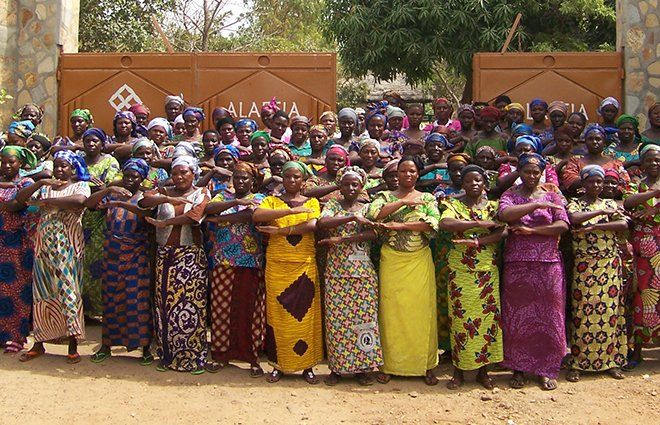It Takes a Village: Alaffia Grows a Community and Gives Back
Alaffia’s story begins with Olowo-n’djo Tchala, who grew up in Togo, West Africa, sharing a small room with his mother and seven siblings. He was inspired by his mother, who continuously found ways to demonstrate kindness and generosity to those around her. After dropping out of school in sixth grade to help support his family through farming and collecting shea nuts, he witnessed the unfair systems that the women around him faced when trading valuable indigenous resources.

Olowo-n’djo met Rose Hyde, the organization’s co-founder in his home village of Kaboli, Togo in 1996. She had been invited there to serve as an environmental volunteer in the Peace Corps. From the beginning, the two shared a desire to positively impact humankind.
A decade later, they returned to the U.S., determined to make a difference in West Africa. While earning his bachelor’s degree, Olowo-n’djo realized he could not ignore the yearning he felt to contribute to improving the way of life for communities in Togo. He was compelled to fight the injustices he faced and witnessed growing up, including gender inequality, through sustainable health, education, and environmental initiatives. In 2004, armed with their understanding of the value of indigenous West African resources and sustainable business ideologies, they launched Alaffia’s first collective.
Alaffia defines itself as “a social enterprise on a mission to invest in a more equitable future”. The company aims to alleviate poverty and advance gender equality through the Certified Fair Trade of indigenous resources and community empowerment projects. The organization’s cooperatives employ thousands of women and indirectly impact the tens of thousands more.
In the Alaffia Village Co-op in Togo, members handcraft indigenous ingredients using traditional African recipes and methods with products finished at the organization’s U.S. headquarters in Olympia, WA. These award-winning products are cruelty-free and do not contain sulfates, parabens, phthalates, mineral oil, artificial color or synthetic fragrance.

Alaffia’s empowerment projects are the organization’s mission in action, funded by the sale of its products, which allows Togolese communities to provide their skills and knowledge to the rest of the world and rise out of poverty. These initiatives include maternal health care, education, eyeglass distribution, reforestation, regenerative agriculture and bicycle donations.
Together with its partners and community, Alaffia is cultivating beauty, equality and empowerment in Togo, West Africa.










